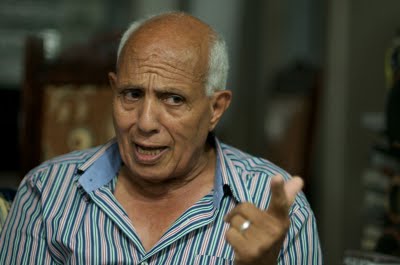Blog August 18, 2011
Cairo Journal: Koranic Recitation
The sound is ubiquitous in Cairo--in taxis, on radio, emanating from loudspeakers on mosques, and especially during Ramadan, in grocery stores and elevators. It's a single voice, male, intoning the words of the Koran with carefully correct pronunciation of classical Arabic--the art known astajweed. To an outsider, this sounds like singing, and indeed, recitation does make use of the Arabic system of musical modes, or maqamat. The melodies can be quite expressive. Yet for the reciter, this is not music. The melodies--always improvised, never composed--are used to bring out emotional expression, but the focus is on the words, the revelation of the Koran, immutable and foundational. The Koran was always meant to be spoken aloud. It came about at time when Arabic poetry was highly advanced, and the text's poetic perfection is one of its essential features. What's more, the Prophet himself made sure the Koran was recited by the most beautiful voices available, that it might move as many people as quickly as possible.
Koranic recitation exists throughout the Muslim world, but it has special characteristics in Egypt. The mellifluous marriage of sacred text and musical art blossomed here, so that by the start of the 20th century, the great musicians of the era--notably Umm Kulthum--would have their start as reciters. Indeed, Umm Kulthum's father used to dress her as a boy so she could travel and recite publicly without ruffling conservative feathers. In the 1960s, there began to be cassette recordings of reciters, and some became superstars, like Sheikh Mustafa Ismail (1905-1978), famous friend of both Kulthum and Gamal Abdel Nasser, among other luminaries. In fact, it is said that Kulthum would sometimes park her car near where Ismail was reciting, her curtains drawn, that she might gain inspiration from him. This is not surprising when you consider that the repetition of lines--Koranic lines for the reciter, poetic ones for the singer--with greater and greater emotional content delivered through expert improvisation based on the maqam system, is a fundamental source of tarab, the ecstatic sensation listeners can experience when they hear great music or great reciting.
As you might imagine, this closeness to music, along with the notion of reciters becoming superstars based on their ability to generate tarab among listeners, was problematic for some religious people. Indeed, during the 1980s, after Anwar Sadat created an opening to Saudi Arabia, a flood of Saudi recitation recordings began to arrive in Egyptian cassette stalls as a more austere alternative to the ever more elaborate local variety of recitation. Meanwhile, the Egyptian recordings continued to spread throughout the Muslim world and to enjoy great popularity.
 |
| Mosques in Old Cairo |









